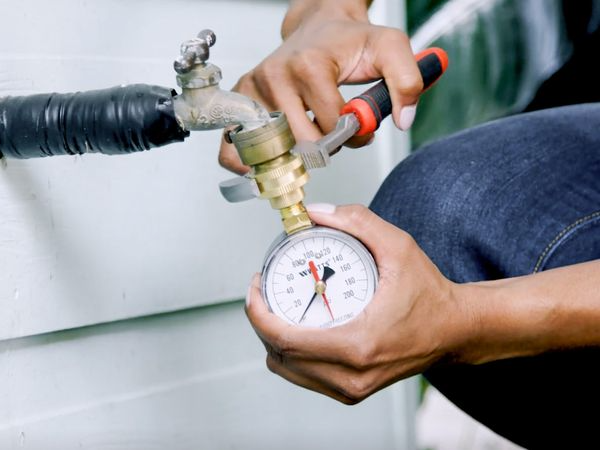(Updated) Water pressure is an important part of your home plumbing system. It is what determines the speed and force at which water flows from your pipes to the sink faucets, toilets, showerheads, and water-reliant appliances in your home. The ideal pressure for your home is somewhere between 40 and 60 pounds per square inch (PSI).
When you hear people complain about the water in their homes, they are usually complaining that their water pressure is too low. While low water pressure can certainly be an annoying plumbing problem to have, problems can also arise when the pressure in your home is too high.

High pressure from a faucet
When the water pressure in your home is too high, it can cause damage to your pipes, the appliances in your home that rely on water like your washing machine and dishwasher, your water heater, and your home plumbing system as a whole. Plus, water that is too high wastes a significant amount of water, and the exorbitantly high water bills that high-pressure causes can cost you a lot of money you wouldn’t have had to spend if the water in your home were within the normal range.
Being able to recognize the telltale signs that the pressure in your home is too high can help you avoid the consequences of this excessively high water pressure. Keep reading to discover 5 signs that your home’s water pressure may be too high.
1. High Water Bills
Consistently high water bills that cannot be explained away by other factors—such as an increase in water usage during the summertime, for example—can be a telltale sign that the water pressure in your home is too high.
When the water pressure in your home is too high, water flows through the pipes in your home plumbing system more quickly and with more force. This causes the showers, faucets, and toilets in your home—as well as any appliances that use water, such as your washing machine and your dishwasher—to use more water than they normally would. This increase in water usage leads to higher water bills, even if you are not intentionally using more water in your home than you normally do.
2. Leaking Faucets and Appliances
Excessively high water pressure can wreak havoc on your faucets and the appliances in your home that rely on water. The parts and seals of faucets and water-reliant appliances get worn out more quickly when the water pressure in your home is too high.
Damage to these parts and seals can cause the faucets and water-reliant appliances in your home to leak. If you notice that your dishwasher and your bathroom faucet—for example—start leaking at around the same time, this could be a clear sign that the water pressure in your home is too high.
3. Malfunctioning Toilets
If you notice that your toilet is running continually or even flushing on its own, the pressure in your home might be too high.
A continually running and automatically flushing toilet is a sign that the fill valve of your toilet is damaged. A damaged fill valve is often a result of excessively high water pressure that causes the valve to become worn out more quickly than it otherwise would be.
4. Limited Hot Water
Water heaters are designed to take in water at a specific rate that allows the water heater to fill up with water, heat that water to a consistent temperature, release the hot water as it is used in your home, and then refill with water to allow the cycle to begin all over again.
If the pressure in your home is too high, however, your water heater will fill up with water too quickly. This makes it difficult for your water heater to heat the water inside it to a consistent temperature because it refills with cold water at a faster rate than it can heat the water inside of it. When this happens, you might notice that the hot water supply in your home runs out more quickly than it usually does.
5. Noisy Pipes
Hearing banging and clanging noises that seem to be running through the walls and ceiling of your home—which is where the pipes in your home plumbing system are located—might mean that the water pressure in your home is too high.
When the pressure in your home is too high and you flush your toilet or turn on a faucet, water rushes to the toilet or the faucet too quickly and with too much force—this force and speed can cause your pipes to shudder, which leads to distinct banging and clanging noises.


